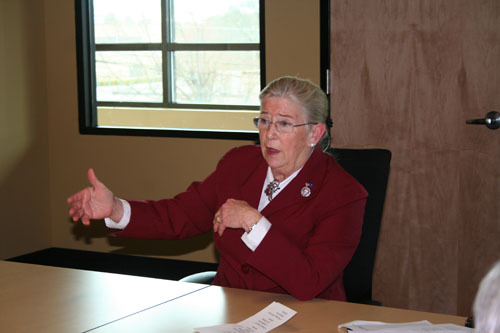McCarthy hopes to see change in foreclosure law
Plans need to help those without work, U.S. Rep. says at Herald meeting
Last week, New York state Attorney General Andrew Cuomo launched an attack on foreclosure rescue fraud, using Elmont as the staging ground.
Saying that New Yorkers in the city and on Long Island were facing an uphill battle to save their homes, Cuomo set out to strike a blow for homeowners’ rights.
Now, U.S. Rep. Carolyn McCarthy is saying that the federal government will be right on Cuomo’s heels when it comes to curbing dangerous behavior on the part of companies that work in the mortgage and foreclosure markets.
While Cuomo has set his sights on foreclosure rescue scams and the companies that perpetrate them, McCarthy said she was interested in bigger game: the banks that issue and guarantee unsustainable loans.
For McCarthy, the foreclosure problem was chiefly one of a breakdown of the financial system, in particular, banks which were not monitoring their loans closely enough.
“A lot of the banks certainly did not heed their own advice on doing due diligence on who they were lending money to,” McCarthy said. “You’re going to see the banks start to go back to doing things the old fashioned way. When you go in for a loan, not only are you going to have to prove that you can pay back that loan, you’re going have to know: Can you pay the insurance? Can you pay your taxes? Can you pay your utilities? I think that is where a lot of the banks got themselves in trouble.”
McCarthy, who was in the Herald offices for a discussion about the issues that concern New York’s 4th Congressional District, said that she has spent much of her time in office voting to keep families in their homes and protect what, in most cases, is the largest single investment a family will make.
The problem in Elmont, in particular, is a dire one. In the month of February, almost one house in five that was for sale in the area had already gone through foreclosure proceedings. In January, more than 500 homes across the county received notice of foreclosure, a number that actually represents just a small chunk of the more than 2,500 that occurred across Long Island and parts of New York City.
McCarthy said the real key to helping people stay in the homes was encouraging people to improve their understanding of how their mortgage works, and how it can affect their life and finances.
For many foreclosure victims, the temptation to buy a home with no equity and an adjustable rate mortgage means the difference — they think — between renting forever and moving into a home. The problem, as has been well documented, is that predatory lenders will aggressively shop this dangerous mortgage combination to families that will never be able to afford it.
With an adjustable rate mortgage, a mortgage payment will stay deceptively low for a short period — usually between six months and a year — and often spike, sometimes doubling or even tripling in size.
“I know a couple of couples that actually did [adjustable rate mortgages],” McCarthy said. “These are smart people, when it came time that the interest rates started to kick in, they couldn’t afford it.”
She said that with any luck, coming legislation would include an imperative for people seeking mortgages, or anyone about to buy a home, to educate themselves on what exactly they’re buying.
“We’re going to be seeing a lot more financial literacy and education,” she said. “People that are going to be taking out mortgages in the future are going to have to go through classes of some sort, we are going to have consumer protections in there.”

 61.0°,
Mostly Cloudy
61.0°,
Mostly Cloudy 




